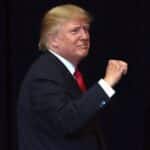

President-elect Donald Trump made a landmark announcement this past Friday night through his social media platform, Truth Social, unveiling his selections for three significant positions in foreign governance and diplomacy.
Fox News reported that Trump announced Morgan Ortagus, Roman Pipko, and Tammy Bruce as his choices for Deputy Special Presidential Envoy for Middle East Peace, U.S. Ambassador to Estonia, and State Department spokesperson, respectively.
Ortagus will assume the role under the leadership of Steven Witkoff, a Middle East envoy with whom she has previously worked.
Ortagus, a former spokesperson for the Department of State, brings extensive expertise, having contributed to U.S. Navy Reserve intelligence, the Abraham Accords team, and financial intelligence analysis within the Treasury Department.
She has also represented U.S. interests in Saudi Arabia as Deputy U.S. Treasury Attaché from 2010 to 2011. Ortagus currently leads Polaris National Security and is known for her radio presence on Sirius XM.
Despite their past professional differences, Trump expressed confidence in Ortagus’s capabilities, noting her strong backing from the Republican faction.
In his words, "These things usually don’t work out, but she has strong Republican support, and I’m not doing this for me, I’m doing it for them." He conveyed hope for reconciliation and achievement by suggesting, "Let’s see what happens." Trump's strategic placement aims to harness Ortagus's experience towards fostering peace and prosperity within the Middle East.
The Middle East has been a focal point for U.S. diplomacy, and Trump highlighted the importance of the role by expressing his expectations for positive outcomes: "We seek to bring calm and prosperity to a very troubled region. I expect great results, and soon!"
Roman Pipko is set to become the ambassador to Estonia, a move anticipated to strengthen diplomatic ties with the Baltic nation.
Raised in Estonia, Pipko’s international comprehension is augmented by his legal education from Columbia University and Yale Law School. As a former representative for American interests in the European Bank for Reconstruction and Development, and the Russian American Enterprise Fund, Pipko’s past endeavors underline his adeptness in international negotiations.
Trump underscored the choice, emphasizing Pipko's unique perspective as a "legal immigrant" who has lived the "promise of America."
He stressed Pipko's potential to enhance bilateral relations and further U.S. interests globally. Pipko has previously engaged with U.S. Government Agencies and foreign governments, advocating for adherence to U.S. sanctions and facilitating international projects.
Tammy Bruce's appointment as the spokesperson for the State Department marks another strategic move by Trump to bring experienced American voices to the forefront.
A prominent political analyst and former contributor for Fox News, Bruce has long been a recognized figure in conservative media circles. She graduated from the University of Southern California with a degree in political science, reinforcing her foundation in governmental affairs.
As a passionate advocate against what she perceives as radical leftist narratives, Bruce's transition from liberal activism in the 1990s to a conservative commentator is noteworthy. Trump's endorsement highlights Bruce's impact over two decades, stating, "Tammy has brought TRUTH to the American People for over two decades."
A spokesperson for Fox News Media noted Bruce’s esteemed contributions, wishing her "all the best in her new role." This gesture signifies the closing of one chapter and the beginning of another.
Collectively, Trump's choices for these critical diplomatic and communication roles underscore his emphasis on securing accomplished individuals with substantial backgrounds in their respective fields. With Ortagus, Pipko, and Bruce, the administration expects to manage intricate international landscapes and articulate U.S. policies effectively to global stakeholders.
The responsibilities accompanying these roles are considerable, with significant geopolitical implications. The ongoing instability in the Middle East, the strategic positioning in Eastern Europe, and the articulation of foreign policy represent vital components of the U.S. diplomatic agenda.



